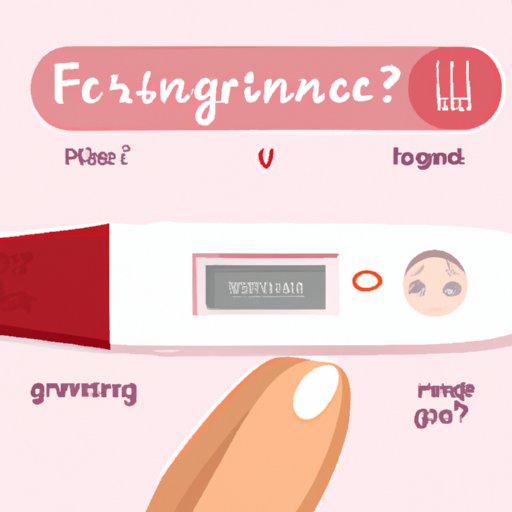
Introduction
If you are trying to conceive or are sexually active, it’s important to know the early signs and symptoms of pregnancy. Paying attention to your body and keeping track of changes can help you determine whether you may be pregnant. In this article, we will explore the physical, hormonal, and emotional changes that can indicate pregnancy, as well as provide tips on how to accurately track and interpret these signs. Whether you are planning to start a family or have just missed your period, this guide will help you know when you are pregnant.
Physical Symptoms of Pregnancy
One of the most common and recognizable signs of pregnancy is a missed period. However, missed periods can also be caused by stress, illness, or changes in medication. Other physical symptoms of pregnancy can include morning sickness, tender and swollen breasts, fatigue, frequent urination, and constipation. These symptoms can vary from woman to woman and from pregnancy to pregnancy. For example, some women may experience severe morning sickness, while others have none at all.
It’s important to pay attention to physical changes in your body and discuss them with a healthcare provider. While these symptoms can indicate pregnancy, they can also be a sign of other medical conditions, such as thyroid problems or infections. A healthcare provider can perform a pregnancy test and recommend appropriate treatment if necessary.
Pregnancy Tests
When it comes to confirming pregnancy, there are several types of tests available. At-home urine tests are a common and convenient way to test for pregnancy. They work by detecting the presence of the hormone human chorionic gonadotropin (hCG) in a woman’s urine. HCG is produced by the placenta after a fertilized egg implants in the uterus.
Blood tests and ultrasounds can also be used to confirm pregnancy and monitor fetal development. Blood tests measure the level of hCG in a woman’s bloodstream. An ultrasound uses high-frequency sound waves to create an image of the developing fetus and can detect pregnancy earlier than a urine or blood test.
To ensure accurate results, it’s important to follow the instructions carefully and take the test at the appropriate time. In most cases, at-home urine tests can detect pregnancy as early as one week after a missed period. Blood tests and ultrasounds may be recommended if a urine test is inconclusive or if there are concerns about the pregnancy.
Changes in Taste/Smell
During pregnancy, many women experience changes in taste and smell perception. These changes can range from a metallic taste in the mouth to a heightened sense of smell. The exact cause of these changes is not fully understood, but hormonal shifts are believed to play a role.
Some women may develop food cravings or aversions during pregnancy. For example, a woman may suddenly desire pickles and ice cream, or become repulsed by certain foods they used to enjoy. While food cravings and aversions can be a sign of pregnancy, they can also be a result of stress, boredom, or other factors. It’s important to listen to your body and eat a balanced diet that includes plenty of fruits, vegetables, and protein sources.
Mood Changes
The hormonal and physical changes that occur during pregnancy can also lead to significant mood changes. Many women experience mood swings, irritability, and anxiety, particularly during the first trimester. These changes can be caused by the sudden increase in hormones, as well as physical discomfort and stress related to pregnancy.
It’s important to take care of your mental health and seek support if you are feeling overwhelmed. Talk to your partner, a trusted friend or family member, or a healthcare provider about your feelings. You may also consider joining a support group for expecting mothers or practicing relaxation techniques such as yoga or meditation.
Changes in Body Temperature
Tracking basal body temperature can also be used to determine if you may be pregnant. Basal body temperature is the lowest temperature of the body during rest, typically measured in the morning before getting out of bed. Around the time of ovulation, basal body temperature may rise slightly and stay elevated if the egg is fertilized.
It’s important to track basal body temperature accurately and consistently over several months to establish a baseline. While this method is not as reliable as a pregnancy test, it can be a useful tool for predicting ovulation and detecting pregnancy early on.
Tracking Menstrual Cycles/Conception Date
One of the most effective ways to determine if you may be pregnant is by tracking your menstrual cycle and determining the conception date. Conception occurs when a sperm fertilizes an egg, and typically happens around two weeks after the start of a woman’s menstrual cycle. If conception occurs, the fertilized egg implants in the uterus and begins to produce hCG.
There are several apps and menstrual period calendars available that can help track menstrual cycles, identify ovulation, and predict the most fertile days. These tools can also help determine the conception date and the expected due date. However, it’s important to discuss these results with a healthcare provider and receive confirmation through a pregnancy test.
Conclusion
Determining if you are pregnant can be an exciting and emotional time. By paying attention to physical symptoms, tracking basal body temperature and menstrual cycles, and using pregnancy tests, you can confirm pregnancy early on and begin preparing for the changes ahead. It’s important to seek professional guidance if you have any questions or concerns, and to take care of yourself both physically and emotionally throughout your pregnancy journey.




